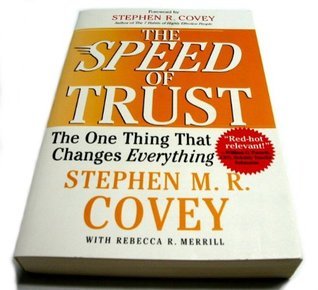“The Speed of Trust” is a book by Stephen M.R. Covey that explores the pivotal role trust plays in personal and professional relationships. The book emphasizes the idea that trust is not merely a social virtue, but a critical economic driver that impacts both speed and cost in all areas of life and business. TRUST plays a crucial role in any leaders aspirations for success. Without trust there is no sale. Leaders are required to sell on a constant basis. They are selling ideas, goals, visions, objectives on a day to day basis.
The Speed of Trust is a great starting point for anyone looking to learn and develop their leadership prowess. Here are just a few of the key takeaways from this highly recommended book.
THE ASSET
Trust is a powerful economic asset. Trust is not just a soft skill; it has a measurable impact on productivity, profitability, and overall success. When trust is present, it creates a positive environment that enhances collaboration, innovation, and efficiency.
THE SKILL
Trust can be learned and developed. Trust is not solely based on personality traits or inherent characteristics. It can be cultivated and strengthened through specific behaviours and actions. Building trust requires consistent integrity, competence, transparency, and empathy.
THE ACCELERANT
Trust accelerates outcomes. When trust is high, communication and decision-making become more efficient. Trust reduces the need for constant oversight and enables faster execution, leading to improved speed, agility, and adaptability within organizations.
THE THREE C’s
Trust is built on credibility, consistency, commitment. Credibility is the foundation of trust. It is established by keeping commitments, honouring commitments, and demonstrating reliability over time. Being consistent, accountable, and delivering on promises builds credibility and fosters trust.
THE RELATIONSHIP
Trust extends beyond personal relationships. Trust is crucial not only in personal interactions but also in business relationships, partnerships, and collaborations. High-trust environments create competitive advantages and enable organizations to navigate change, resolve conflicts, and create mutually beneficial outcomes.
THE SELF
Trust starts with self-trust. Building trust with others begins with developing trust in oneself. Being authentic, knowing and aligning with personal values, and being honest with oneself are essential aspects of self-trust that radiate into relationships with others.
“The Speed of Trust” offers a compelling case for the vital role trust plays in personal and professional success. It provides practical insights and strategies for individuals and organizations to cultivate trust, enhance relationships, and achieve higher levels of performance and effectiveness.
As a leader in business, how do you build trust, i welcome your thoughts and points of view in the comments below.
“The Speed of Trust” is a book by Stephen M.R. Covey that explores the pivotal role trust plays in personal and professional relationships. The book emphasizes the idea that trust is not merely a social virtue, but a critical economic driver that impacts both speed and cost in all areas of life and business. TRUST plays a crucial role in any leaders aspirations for success. Without trust there is no sale. Leaders are required to sell on a constant basis. They are selling ideas, goals, visions, objectives on a day to day basis.
The Speed of Trust is a great starting point for anyone looking to learn and develop their leadership prowess. Here are just a few of the key takeaways from this highly recommended book.
THE ASSET
Trust is a powerful economic asset. Trust is not just a soft skill; it has a measurable impact on productivity, profitability, and overall success. When trust is present, it creates a positive environment that enhances collaboration, innovation, and efficiency.
THE SKILL
Trust can be learned and developed. Trust is not solely based on personality traits or inherent characteristics. It can be cultivated and strengthened through specific behaviours and actions. Building trust requires consistent integrity, competence, transparency, and empathy.
THE ACCELERANT
Trust accelerates outcomes. When trust is high, communication and decision-making become more efficient. Trust reduces the need for constant oversight and enables faster execution, leading to improved speed, agility, and adaptability within organizations.
THE THREE C’s
Trust is built on credibility, consistency, commitment. Credibility is the foundation of trust. It is established by keeping commitments, honouring commitments, and demonstrating reliability over time. Being consistent, accountable, and delivering on promises builds credibility and fosters trust.
THE RELATIONSHIP
Trust extends beyond personal relationships. Trust is crucial not only in personal interactions but also in business relationships, partnerships, and collaborations. High-trust environments create competitive advantages and enable organizations to navigate change, resolve conflicts, and create mutually beneficial outcomes.
THE SELF
Trust starts with self-trust. Building trust with others begins with developing trust in oneself. Being authentic, knowing and aligning with personal values, and being honest with oneself are essential aspects of self-trust that radiate into relationships with others.

“The Speed of Trust” offers a compelling case for the vital role trust plays in personal and professional success. It provides practical insights and strategies for individuals and organizations to cultivate trust, enhance relationships, and achieve higher levels of performance and effectiveness.
As a leader in business, how do you build trust, i welcome your thoughts and points of view in the comments below.

